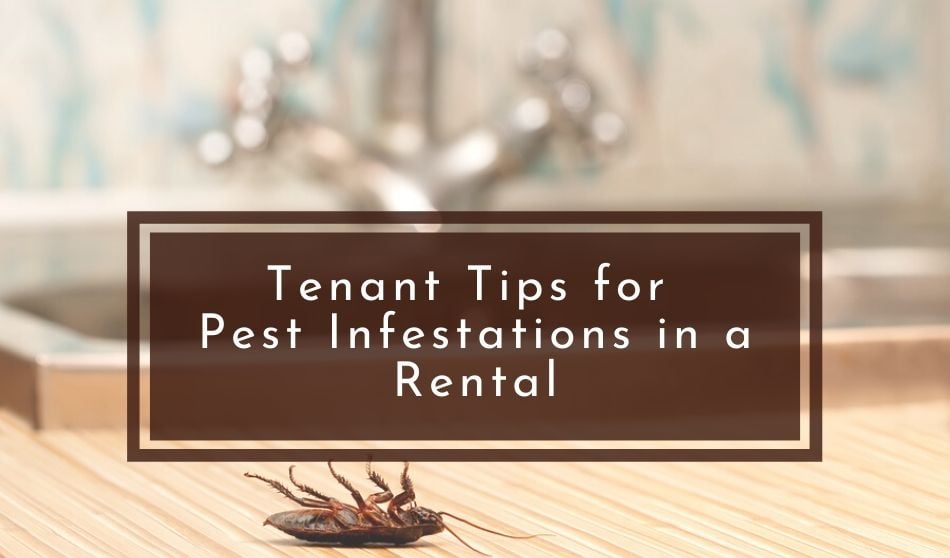
Infestations in a rental home are the nightmares of landlords and tenants alike.
No landlord enjoys facing the costs and hassle associated with hiring an exterminator to ensure their investment is protected, and no tenant relishes the thought of creepy crawlies venturing into their bed and pantry.
Factors like weather, surrounding properties, and a tenant’s general cleanliness all play a factor in a case where pests have entered the rental. And with more people staying inside their homes and apartments, there is a chance that the presence of more food stored and cooked at home can serve as an extra invitation to pests.
Often, these factors can cause the responsibilities for pest elimination to be a point of contention and confusion among landlords and their tenants. While exterminators–and their associated fees–can be necessary in cases of moderate to severe infestation, there are solutions for renters who find themselves sharing their space with a few unwanted guests in the form of pests.
Prevention
They say an ounce of prevention is worth a pound of cure, and that couldn’t be truer in the case of vermin or insects in the home. Discovering pests in your home is never fun, but taking simple steps to deter pests, can stop the problem before a full-fledged infestation occurs.
Be vigilant about daily cleaning; food made accessible through unsealed pantry items or leftover remnants on dirty dishes can attract an infestation. Ensure you are keeping your belongings free of clutter, organize toys, storage items and other objects that could accumulate otherwise. Clutter can serve as a breeding ground for insects and spiders that prefer a warm untouched place to stay.
Home Remedies for Pest Elimination
Renters facing a small number of pests can rely on common household items to rid themselves of the problem, according to Amber Morris, a consultant and exterminator with 24/7 Pest Control. Morris recommends using essential oils which can serve to deter multiple pests.
Essential Oils
Try mixing 1.5 teaspoons of tea tree oil and a cup of water can create a spray that’s sent will act as a deterrent against cockroaches. Simultaneously, strategically placed cotton balls soaked with 20-25 drops of peppermint essential oil can create a scent that odor sensitive rodents will seek to avoid. Peppermint or eucalyptus oil can also deter ants when 25 drops are mixed with one cup of water.
Morris says, “These solutions work because they interfere with the chemical signals ants use to communicate. The insects trail their way to a food source with pheromones which means that when they pass through a treated area, their trail will be disrupted. Moreover, once the ants get covered with the scent, they bring it back to the colony, spreading the solution all over the place which confuses all of the other ants as well, so you can keep them at bay.”
Spices and Herbs
Brad Leahy of B.O.G. Pest Control also has a few suggestions for home pest deterrents that renters can use on their own. He suggests using home products like cinnamon, cayenne pepper, or coffee grounds by sprinkling them at the point of entry to keep ants at bay.
Furthermore, investing in specific plants can repel certain pests; citronella, lavender, peppermint and rosemary in small planters can keep mosquitoes away while you enjoy your porch or balcony. During summer cookouts, placing rosemary or sage on the coals of your grill can ward off mosquitos while becoming a flavorful addition to your burgers.
In spite of the natural remedies available for the do-it-yourself crowd, Leahy advises seeking a professional’s help if the problem gets out of hand; he warns “Using a home remedy can help if you have a few bugs find their way into your home, but it’s not going to help you stop an infestation.”
Who is Responsible for Extermination?
Should you find that your rental is truly infested, you will need an expert to fully resolve the pest problem.
Lease agreements should explicitly have stipulations for pest elimination and its responsibility. In cases where the pest invasion falls under a gray area, tenants and landlords can often find themselves unsure of who is responsible for procuring and paying for an exterminator. Generally, it is in the landlord’s best interest to protect the property and quickly address the issue to ensure that the rental is legally habitable.
This does not mean, however, that a negligent tenant is off the hook. If you, as a renter, have failed to clean appropriately (and thus have invited an infestation), or your pet brought pests into the home, you can be financially liable for the fees associated with extermination and your security deposit can suffer.
Professional exterminators can often attest to the nature of an infestation, and determine if your habits have invited pests. In cases where the true source cannot be determined, remember, that it is in both you and your landlord’s benefit to eliminate the problem as quickly and effectively as possible, so be willing to offer compromises (like splitting the costs of an exterminator).
Conclusion
Pest prevention is the ultimate way to protect your space from an invasion of unwanted and disease-carrying pests. Tenants should always be proactive about cleaning up refuse and clutter, and ensure that their pets are appropriately protected against fleas and other creatures that could enter the home. Most importantly, it is wise to discuss details like pest elimination policies with your landlord or property manager before entering into a lease agreement. The more questions you ask before a problem occurs, the more prepared you will be should the issue ever arise.